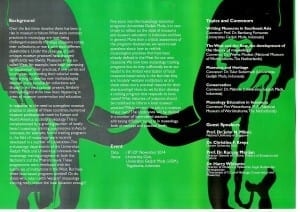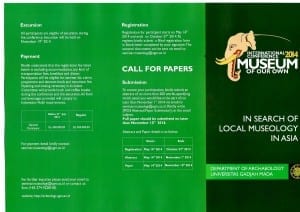Department of Archaeology Universitas Gadjah Mada
Yogyakarta, 18th-20th November 2014
Background
Over the last three decades there has been a rise in museum criticism. What were common practices in museology are now being challenged; especially the ways museums curate their collections, or work with their different stakeholders. Under the pressure of such critique, museum practices have changed significantly worldwide. Museums in the so-called West, for example, have been attempting to ‘decolonize’ their practices, if only partial and incomplete, confronting their colonial roots, while trying to develop new methodologies deemed more suitable for collections and display in the post colonial present. Similarly methodological shifts have been happening in areas of museum conservation and education.
Co-terminus with this rethinking of museums in the West has been similar developments in museology in so-called non-traditional museum spaces, including, and perhaps, especially in Asia, with significant rise in the number of museums as well as an increase in museum training programmes. Despite these sea changes, and the long history of established museum tradition in many non-western societies – in many instances since the 19th century – these local museums remain marginal institutions. In fact, the word ‘museum’ still remains uncommon within the cultural vocabulary of many such societies. Recently academics have tried to identify non-western museological models, where, for example, preservation practices that parallel those in conventional museums can be found. Still these models have not developed sufficiently. Nor are they sufficiently valorized and embedded within museum practice to have the desired effect of improving the status of museums in and the value of museums to these societies.
In response to the need to strengthen museum practice in several of these countries, numerous museum professionals travel to Europe and North America to study museology. This is complemented by a growing number of locally based museology training programmes in Asia. In Indonesia, for example, formal training programs in the field of museology were recently developed in a number of Universities. The archaeology departments of the Universitas Gadjah Mada and Universitas Indonesia have museology training programs at both the Bachelors and the Masters levels. These programmes were developed with the assistance of institutions in the West. But have these local based programs worked? Or, do those who return with ‘western’ museology training really impact the local situation enough?
Five years into the museology education programs Universitas Gadjah Mada, it is now timely to reflect on the state of museums and museum education in Indonesia and Asia in general. More than a critical assessment of the programs themselves, we want to ask questions about how to rethink museological practices that have been already defined in the West for our own museums. We now have museology training programs but do they sufficiently serve our needs? Is the limited valorization of local museums based solely in the fact that they are ‘innately’ western institutions or are there other, more practical reasons for their shortcomings? How do we further develop a training program that responds to local needs? What histories of museums should be mobilized to inform a local museum practice? What, we want to ask, is a museum of our own? The conference will be divided in a number of interrelated sessions addressing different topics in in museology, both at concept and practical levels.
Sila kunjungi:
http://arkeologi.fib.ugm.ac.id/main/2014/05/call-for-papers/
https://www.facebook.com/events/1473094699629048/?notif_t=plan_user_joinedhttps://www.facebook.com/events/1473094699629048/?notif_t=plan_user_joined



